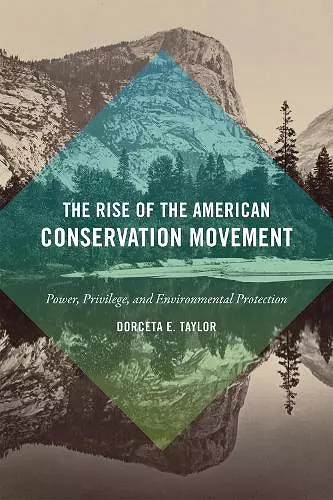The Rise of the American Conservation Movement
Power, Privilege, and Environmental Protection
Format:Paperback
Publisher:Duke University Press
Published:26th Aug '16
Currently unavailable, and unfortunately no date known when it will be back
This paperback is available in another edition too:
- Hardback£99.00(9780822361817)

In this sweeping social history Dorceta E. Taylor examines the emergence and rise of the multifaceted U.S. conservation movement from the mid-nineteenth to the early twentieth century. She shows how race, class, and gender influenced every aspect of the movement, including the establishment of parks; campaigns to protect wild game, birds, and fish; forest conservation; outdoor recreation; and the movement's links to nineteenth-century ideologies. Initially led by white urban elites—whose early efforts discriminated against the lower class and were often tied up with slavery and the appropriation of Native lands—the movement benefited from contributions to policy making, knowledge about the environment, and activism by the poor and working class, people of color, women, and Native Americans. Far-ranging and nuanced, The Rise of the American Conservation Movement comprehensively documents the movement's competing motivations, conflicts, problematic practices, and achievements in new ways.
"This book counterbalances previous hagiographic portrayals of conservationists, examining and judging the past from the perspective of modern values but minimizing the contributions of scientists not part of the establishment. Nevertheless, the book should interest historians and naturalists. . . . Recommended. Graduate students, researchers, faculty." -- J. S. Schwartz * Choice *
"Taylor has produced an extremely helpful book that defines and contextualizes important laws, concepts, social groups, and people who participated, or were alienated by, the rising American conservation movement." -- Margaret DePond * Environmental History *
"An important addition to the historiography of the American conservation movement. . . . [Taylor's] synthesis of the ideas of the conservation movement, and the depth that she adds with her discussions of race and exclusion, in particular, make this work an important one for an understanding of the environmental history of the United States." -- Kimberly A. Jarvis * Journal of Social History *
"Taylor accomplishes a transformative feat of scholarship. . . . She has authored a book that challenges the dominant interpretive frameworks of the field of environmental history and deserves a central place in introductory and ntermediate environmental courses. Just as importantly, she illuminates the overlapping historical roots of our present environmental predicament." -- Jennifer Thomson * Journal of the Gilded Age and Progressive Era *
"An ambitious book. . . . A useful reference to anyone interested in environmental protection, and particularly its social dimensions, during the nineteenth and early twentieth centuries." -- Joshua M. Nygren * Agricultural History *
"Covers an astonishing range of topics. . . . [M]any of [Taylor's] profiles are fascinating and significant in bringing new characters and elements into the mix of America’s conservation record." -- David Havlick * American Historical Review *
"A well-written book. . . . Exceptional both in the manner of presentation and scope." -- Nathaniel Umukoro * Ethnic and Racial Studies *
"A wide-ranging work, invoking numerous themes and moving in many different directions. . . . A valuable contribution to the field by opening new areas of inquiry as to how the confluences of class, race and gender can inform both environmental and social history." -- Nathan Perz * History *
"The Rise of the American Conservation Movement shines when women like Sacagawea are described in ways that explode myths of the supposedly inherent connections among masculinity, ruggedness, and wilderness. . . . An excellent overview of the ACM." -- Robert Wengronowitz * International Sociology *
"Dorceta E. Taylor’s book is a very useful corrective to the common focus on a few 'great' conservation heroes, such as Gifford Pinchot and Theodore Roosevelt. It is also pleasing to see the role of women acknowledged in a deeper and more satisfactory way than in previous syntheses, though Taylor rightly points out the masculinist domination of much of the conservation activity she calls a 'movement.' This book succeeds best as a powerful critique of conservation’s ethnocentrism and class dimensions." -- Ian Tyrrell * Journal of American Studies *
"Taylor . . . highlights the effects of moralization on access to nature. She reveals the class, ethnoracial, and gender biases in these conservation movements and demonstrates their consequences: the exclusion of various minority populations and inequalities in the use and presence of, and public debate surrounding, natural resources." -- Hillary Angelo * Public Books *
ISBN: 9780822361985
Dimensions: unknown
Weight: 680g
496 pages